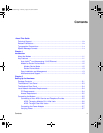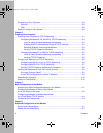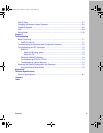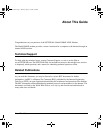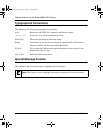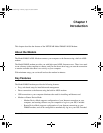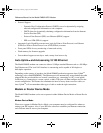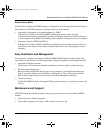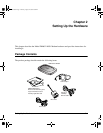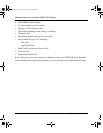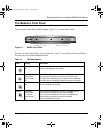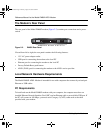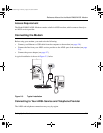
Reference Manual for the Model DM602 ADSL Modem
1-2 Introduction
• Protocol Support
– Dynamic Host Configuration Protocol (DHCP) server for dynamically assigning
network configuration information to one computer.
– DHCP client for dynamically obtaining configuration information from the Internet
Service Provider (ISP)
– Point-to-Point Protocol (PPP) over Ethernet (PPPoE) support
– PPP over ATM (PPPoA) support
• Automatic Login Capability executes user login for Point to Point Protocol over Ethernet
(PPPoE) or Point to Point Protocol over ATM (PPPoA) accounts
• Front panel LEDs for easy monitoring of status and activity
• Flash memory for firmware upgrade
• Free technical support seven days a week, twenty-four hours a day
Auto Uplink
TM
and Autosensing 10/100 Ethernet
The Model DM602 modem can connect to either a 10 Mbps standard Ethernet card or a 100 Mbps
Fast Ethernet card. The local LAN interface is autosensing and is capable of full-duplex or
half-duplex operation.
Depending on the country of purchase, the Model DM602 modem incorporates Auto Uplink
TM
technology (also called MDI/MDIX). The Ethernet port will automatically sense whether the cable
plugged into the port should have a 'normal' connection (e.g. connecting to a PC) or an 'uplink'
connection (e.g. connecting to a router, switch, or hub). That port will then configure itself to the
correct configuration. This feature also eliminates the need to worry about crossover cables, as
Auto Uplink
TM
will accommodate either type of cable to make the right connection.
Modem or Router Device Mode
The Model DM602 modem can be set to operate in either Modem Device Mode or Router Device
Mode.
Modem Device Mode
When set to operate in Modem Device Mode, your computer must be configured for whatever
settings your ISP requires. Also, if your ISP uses software to establish your Internet connection,
such software must be run on your computer.
DM602.book Page 2 Monday, August 12, 2002 6:09 PM




